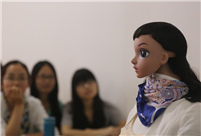

 |
| Tourists are seen wearing face masks in Soul, capital of South Korea, June 5, 2015. Public distrust deepened in South Korea over the government's response to the deadly Middle East Respiratory Syndrome (MERS) as the government belatedly broadened countermeasures after a surge in the viral disease spread. (Xinhua/Yao Qilin) |
SEOUL, June 7 -- Central and municipal governments in South Korea said Sunday that they will cooperate in tackling the spread of the Middle East Respiratory Syndrome (MERS) after infection cases surged to 64.
Health Minister Moon Hyung-pyo held a joint press conference with Seoul Mayor Park Won-soon and governors of the Gyeonggi Province and the South Chungcheong Province, agreeing to form a joint work force to cooperate in the MERS confirmation and share all information on the MERS contagion.
Municipal governments of Seoul, Daejeon, the Gyeonggi and South Chungcheong provinces will be authorized to confirm the MERS infection, of which the confirmation authority had been given to the central government alone.
All information on the MERS contagion, including personal information of infectees and where they visited, will be shared among the central and municipal governments.
The four regions are where the MERS contagion mainly occurred. Almost 40 people contracted the MERS virus at the Pyeongtaek St. Mary's Hospital in Pyeongtae, Gyeonggi Province, while 17 people were infected at the Samsung Medical Center in Seoul. Five people caught the virus at the Konyang University Hospital in the South Chungcheong Province.
Fourteen new cases were reported on Sunday alone, marking the fastest daily increase since the first patient was tested positive on May 20. The total number jumped to 64.
Among the total, 10 people contracted the virus at the emergency room of the Samsung Medical Center, in which the 14th patient has been hospitalized for three days from May 27.
The 14th infectee was estimated to have transported the virus from the Pyeongtaek St. Mary's Hospital, where the first patient was hospitalized for three days from May 15, to the Samsung Medical Center.
The cooperation between central and municipal governments came as Seoul Mayor Park Won-soon and mayor of Seongnam in Gyeonggi Province unveiled information on MERS infections to urge people visiting the MERS-related hospitals to report their visit to the authorities and be voluntarily put under self-quarantine at home.
Park disclosed suspicions on Thursday night that a doctor of the Samsung Medical Center strode down the street under MERS contagion and had contact with thousands of unspecified individuals, raising a public alertness and causing a turn in the central government's response.
The government planned to monitor all suspected MERS infectees, who had contact with confirmed patients, one by one and trace the mobile phones of suspects who cannot be reached.
A total of 2,361 people have been put under quarantine for possible MERs infection Sunday, the health ministry said. Among them, 560 people have been freed from the isolation as the incubation period of two weeks passed.
Sixty-nine kindergartens and 57 elementary schools in two districts in Seoul, located near the Samsung Medical Center, will be forced to suspend classes for three days from Monday.
Seven regions in the Gyeonggi Province will forcibly halt classes of elementary, middle and high schools as well as kindergartens from Monday to Friday.
 J-11 fighters in air exercise
J-11 fighters in air exercise Beauties dancing on the rings
Beauties dancing on the rings Charming robot teacher gives lecture in Jiangxi
Charming robot teacher gives lecture in Jiangxi Hefei-Fuzhou railway line put into trial operation
Hefei-Fuzhou railway line put into trial operation Graduation season of a costume designing major
Graduation season of a costume designing major PLA soldiers operate antiaircraft guns in drill
PLA soldiers operate antiaircraft guns in drill Villagers pick cubiloses on cliff in Sichuan
Villagers pick cubiloses on cliff in Sichuan Attendants-to-be join Mr. & Miss Campus Contest
Attendants-to-be join Mr. & Miss Campus Contest China hosts overseas disaster relief exercise for the first time
China hosts overseas disaster relief exercise for the first time Manila overvalues new pact with Tokyo
Manila overvalues new pact with Tokyo The mysterious ‘people of Chaoyang district’
The mysterious ‘people of Chaoyang district’ NDRC mulls new guidelines for auto sector
NDRC mulls new guidelines for auto sector Opportunists in Hong Kong target traders to exploit resentment of mainland
Opportunists in Hong Kong target traders to exploit resentment of mainlandDay|Week